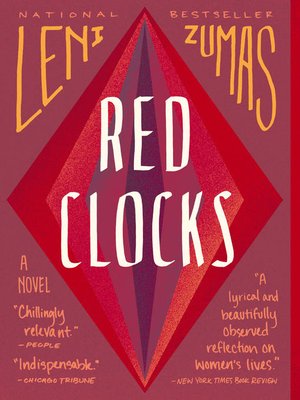

One of Ro’s students, an adopted girl of fifteen called Mattie, falls pregnant and seeks out an illegal termination. Meanwhile, her friend Susan is trapped in patriarchal utopian hell as a dysfunctional housewife and mother of two children who is yearning to escape the monotony of her existence and the restrictions of the patriarchal nuclear family unit. Time is running out for Roberta, a history teacher, who is desperate for a child but has no partner and therefore must achieve pregnancy before new laws prevent her from undergoing treatment to become pregnant through a sperm donor. In Zumas’s not-too-distant future, abortion is illegal and new laws to ban single parenting (even through artificial insemination and adoption) are pending.

It’s not too far a leap to make, as is often the case in female-centric dystopian narratives.

Set in a secluded Oregan fishing town, Leni Zumas’s second novel, Red Clocks, explores a world where women have lost the right to their own bodies and reproductive autonomy. This is a story of resilience, transformation, and hope in tumultuous-even frightening-times.Leni Zumas (2018). In the vein of Margaret Atwood and Eileen Myles, Leni Zumas fearlessly explores the contours of female experience, evoking THE HANDMAID'S TALE for a new millennium. RED CLOCKS is at once a riveting drama, whose mysteries unfold with magnetic energy, and a shattering novel of ideas.

And Gin is the gifted, forest-dwelling herbalist, or "mender," who brings all their fates together when she's arrested and put on trial in a frenzied modern-day witch hunt. Mattie is the adopted daughter of doting parents and one of Ro's best students, who finds herself pregnant with nowhere to turn. Susan is a frustrated mother of two, trapped in a crumbling marriage. Ro, a single high-school teacher, is trying to have a baby on her own, while also writing a biography of Eivør, a little-known 19th-century female polar explorer. In a small Oregon fishing town, five very different women navigate these new barriers alongside age-old questions surrounding motherhood, identity, and freedom. In this ferociously imaginative novel, abortion is once again illegal in America, in-vitro fertilization is banned, and the Personhood Amendment grants rights of life, liberty, and property to every embryo.


 0 kommentar(er)
0 kommentar(er)
